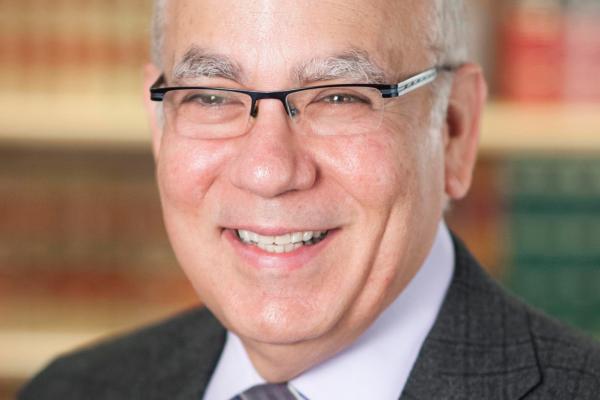Shane testifies at Kavanaugh confirmation hearing

Read Shane’s testimony in full here: http://go.osu.edu/CaAx
When Mershon affiliate Peter Shane, Jacob E. Davis and Jacob E. Davis II Chair in Law, was called upon by Democrats to testify at Judge Brett Kavanaugh’s confirmation hearings to the U.S. Supreme Court, the hearings were set to begin in just 12 days. Shane had even less time to prepare his testimony: His remarks were due two days in advance, and of course, he still had to teach.
Shane thought accessibility would be of paramount importance to his presentation. “I often say that the hardest things for me to teach are the things that I know the most about,” he said. “The senators themselves are quite sophisticated, but they’re also using the arguments that they hear from witnesses to shape the public narrative about what the nomination represents — either for it or against it. It’s not really helpful to them to have a kind of jargon-laden legal memorandum. They need something that’s more accessible than that.”
Shane ultimately honed his testimony around a central point: It’s a perilous time in American politics to create the most executive power-indulgent Supreme Court since World War II. In his view, Kavanaugh’s confirmation would do just that. Referring to Kavanaugh as an “extreme presidentialist,” Shane cautioned that his nomination to the Supreme Court could effectively undermine President Donald Trump’s accountability to the rule of law.
“Our current president daily expresses his contempt for democratic institutions and the rule of law,” Shane testified. “He believes that all three branches of government, not to mention the press and the private sector, should heel to his personal command. He chafes at the Constitution’s constraints on his power. Now is a dangerous moment to elevate to the Supreme Court any justice who would weaken the president’s accountability to law.”
Shane was joined by John W. Dean, former counsel to President Richard Nixon; Rebecca Ingber, associate professor of law at Boston University; and Lisa Heinzerling, Justice William J. Brennan Jr. Professor of Law at Georgetown University.
At the hearing, Shane described how Kavanaugh’s association with a constitutional theory known as Unitary Executive Theory could have extreme implications, especially given special counsel Robert Mueller’s investigation into the Trump administration.
“Year in and year out, administrative lawyers like me worry about this in regard to the president telling the EPA what to do, or the Department of Labor what to do, and so forth,” Shane said. “But now, we’re worried about the president telling criminal prosecutors what to do, and that is the special danger at this moment.”
As Shane explained, the Constitution itself vests the president with virtually no peacetime authority to regulate domestic affairs like the environment, the economy, or civil rights — any such authority in the executive branch is provided by Congress instead. Even though Congress may define the authority of the executive branch within specific limits, administrative statutes inevitably leave the executive branch a fair amount of room for discretionary judgment in how to carry them out.
Adherents to Unitary Executive Theory believe that because the president has executive power under Article II of the Constitution, he or she has the authority to remove any administrator of the executive branch from office and to direct how they exercise all their discretionary functions under the administrative statutes enacted by Congress. Kavanaugh isn’t just a believer in his theory, Shane argued, he has also campaigned extensively in support of it throughout his career.
“Specifically, I wanted senators to know that he’s trotted out these theories in detail in cases where they weren’t really relevant,” he said. “That worries me because judges are supposed to be judges, they’re not supposed to be advocates.”
Shane has been teaching constitutional law with a focus on law and the presidency since 1981 and is a co-author of the only law school casebook on separation of powers law, Separation of Powers Law: Cases and Materials (4th ed. 2018). It was a personal and professional honor, he said, having such a visible role in hearings that could influence the course of American law for decades to come.
“It’s a lot of responsibility to be asked to give voice to a set of concerns that are not idiosyncratic to me but shared by a great many people for whom I am effectively their temporary spokesperson,” he said. “When you think about any subject for a long time as an academic, when a lot of your thinking takes the form of law review articles, it’s easy to wonder, did any of this matter, is anybody reading this? I don’t want to aggrandize this beyond what it is — this is not serving in the military or being a professional firefighter — but it is a kind of public service, and I hope to do that as well as someone in my role can do it.”
This story originally appeared in Briefing Room by Moritz College of Law.
